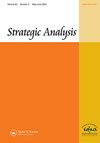India–Africa Relations: Changing Horizons
IF 0.5
Q3 INTERNATIONAL RELATIONS
引用次数: 0
Abstract
I ndia’s partnership with Africa has come into the limelight in recent years. Prime Minister Narendra Modi during his Address to the Ugandan parliament in 2018 reiterated that Africa is a high priority for India’s foreign policy. India-Africa Relations: Changing Horizons by Rajiv Bhatia is a welcome addition to the literature on India’s engagement with the African continent. In this volume, Bhatia has put to good use, the insights gained during his 37-year innings in the Indian Foreign Service (IFS), particularly his term as India’s High Commissioner to Kenya, South Africa and Lesotho. The focus of this book is on analysing India-Africa relations in the past two decades. Why is it so important to study the changing horizons or the changing relationship between India and Africa? The author makes it clear right in the beginning: by 2050, India and Africa will be home to 4.1 billion people accounting for 42 per cent of humankind. How they relate to each other is indeed a subject of global interest. While the title of the book suggests it to be a study of India-Africa relations, the reader gains insights on several other important issues. It gives a clear picture of why Africa is often hailed as the continent of the future; whether it is in terms of population or economic growth. Notably, four of the fastest growing economies in the world belong to Africa including Ivory Coast, Ethiopia, Ghana and Rwanda. African leaders have been pushing for ‘African solutions for African problems.’ In the words of the President of Rwanda, Paul Kagame, ‘Africa’s story has been written by others, we need to own [up to] our problems and solutions and write our story.’ The author discusses the innovative plans and mechanisms initiated by the African countries, such as the African Union’s Agenda 2063. This reflects a pan-African vision of an integrated, prosperous and peaceful Africa. The innovative framework of the African Peer Review Mechanism, to which 33 of the 54 countries agreed, reflects the enthusiasm within Africa to self-evaluate on issues related to governance. The launch of the African Continental Free Trade Area (AfCFTA) in 2019 is another step taken by African countries to enhance the economic integration process. The author provides a stimulating analysis of India’s relations with African countries. While the focus is on the relationship in recent years, the author takes a quick peep into the history of India-Africa relations mainly to re-emphasize the point that India-Africa relations are not new and go back centuries. He provides Strategic Analysis, 2022 Vol. 46, No. 6, 638–640, https://doi.org/10.1080/09700161.2022.2149986印非关系:变化的视野
近年来,印度与非洲的伙伴关系成为人们关注的焦点。2018年,印度总理纳伦德拉·莫迪在向乌干达议会发表讲话时重申,非洲是印度外交政策的重中之重。拉吉夫·巴蒂亚的《印非关系:改变视野》是关于印度与非洲大陆交往的文献中受欢迎的补充。在这本书中,巴蒂亚很好地利用了他在印度外交部(IFS)任职37年期间,特别是在担任印度驻肯尼亚、南非和莱索托高级专员期间获得的见解。这本书的重点是分析过去二十年的印非关系。为什么研究印度和非洲之间不断变化的视野或不断变化的关系如此重要?作者一开始就明确指出:到2050年,印度和非洲将拥有41亿人口,占全球人口的42%。它们之间的关系确实是一个全球关注的话题。虽然这本书的标题表明它是对印非关系的研究,但读者对其他几个重要问题也有了深入的了解。它清楚地说明了为什么非洲经常被誉为未来的大陆;无论是人口还是经济增长。值得注意的是,世界上增长最快的经济体中有四个属于非洲,包括科特迪瓦、埃塞俄比亚、加纳和卢旺达。非洲领导人一直在推动“非洲解决方案”来解决非洲问题。用卢旺达总统保罗•卡加梅(Paul Kagame)的话来说,非洲的故事已经被别人书写了,我们需要承认我们的问题和解决方案,书写我们的故事。作者讨论了非洲国家发起的创新计划和机制,如非洲联盟的《2063年议程》。这反映了一个一体化、繁荣与和平的非洲的泛非愿景。54个国家中有33个国家同意了非洲同行审查机制的创新框架,这反映了非洲内部对与治理有关的问题进行自我评价的热情。2019年非洲大陆自由贸易区的启动,是非洲国家推进经济一体化进程的又一举措。作者对印度与非洲国家的关系进行了发人深省的分析。在关注近年来印非关系的同时,作者对印非关系的历史进行了快速回顾,主要是为了再次强调印非关系并不是新的,而是可以追溯到几个世纪以前。他提供《战略分析》,2022年第46卷,第6期,638-640,https://doi.org/10.1080/09700161.2022.2149986
本文章由计算机程序翻译,如有差异,请以英文原文为准。
求助全文
约1分钟内获得全文
求助全文

 求助内容:
求助内容: 应助结果提醒方式:
应助结果提醒方式:


